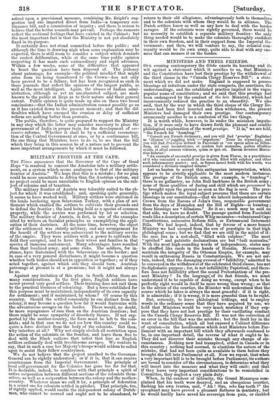MILITARY FRONTIER AT THE CAPE.
THE Times announces that the Governor of the Cape of Good Hope "is resolved to convert the Amatolas into a military settle- ment, on a system which seems analogous to that of the military frontier of Austria." We hope that this is a mistake ; for no plan could be more unsuitable to Africa than the Austrian system, and no project could be more unsuitable to English opinion on the sub- ject of colonies and of taxation.
The military frontier of Austria was tolerably suited to the ob- ject for which it was established; and, speaking quite generally, it seems to have worked well. Military settlers were stationed on the lands bordering upon Sclavonian. Turkey, with a plan of set- tlement which enabled the settlers to cultivate their grounds and to defend the frontier ; the land being held as a species of common property, while the service was performed by lot or selection. The military frontier of Austria, in fact, is one of the examples cited by writers on Socialist principles as exemplifying the appli- cation of their doctrines. At the same time, however, the object of the settlement was strictly military, and any arrangement for the benefit of the settlers was subservient to the military service of the empire. They were soldiers with a power to cultivate the field they occupied, and to have their wives and families in that species of immense cantonment. Many advantages have resulted from that localized army, and some risks. The soldiers, for in- stance, have fraternized with the Sclavonians on the border; and in case of a very general disturbance, it might become a question
whether both bodies should act in opposition or together ; or if they acted together, against which side they should turn. Austrian patronage at present is at a premium ; but it might not always be 80.
Against any imitation of this plan in South Africa there are many considerations. In the first place, English soldiers have never proved very good settlers. Their training does not suit them to the practical business of colonizing. But a force established for this purpose must be maintained, independently of its own capacity for settlement; and if maintained, by whom ? Of course by this country. Should the settled community be one distinct from the colony, it may become a question how far it would fraternize with the adventurous savages on the border. There would, no doubt, be more repugnance of race than on the Austrian frontiers ; but there might be some sympathy of disorderly licence. If not sup- ported by the mother-country, the force must be left to the colonists; and in that case we do not see how this country could re- quire a force distinct from the body of the colonists. But then, why interfere at all ? Why not simply abolish all restriction upon the action of the colonists on the frontier, and leave them free to deal with the Black outlaws that infest that line as English settlers ordinarily deal with troublesome savages. We venture to say, that in such a case her Majesty's troops would seldom be called upon to assist their fellow countrymen. We do not believe that the project ascribed to the Governor- General can be rightly understood ; or if it is, that it can receive countenance from the Imperial Government. The principle of local self-government for the Colonies has gone too far for that. It is desirable, indeed, to combine with that principle a spirit of active cooperation between different sections of the colonists them- selves, as well as a cooperation between the colony and the mother- country. Whatever name we call it by, a principle of federation is a sound one for colonists settled in patches. That principle, too, if rightly applied, would enable the independent colony of Dutch- men, who cannot be coerced and ought not to be abandoned, to return to their old allegiance, advantageously both to themselves and to the colonists with whom they would be in alliance. The Dutch settlers know as well as any how to deal with the border savages. If the colonists were rightly governed, there would. be no necessity to establish a separate military frontier : the only thing needed would be to make the colonists thoroughly confident in their own freedom, and in their support from the Imperial Go- vernment; and then, we will venture to say, the colonial com- munity would be its own army, quite able to deal with any ene- mies that can menace it on the border.


























 Previous page
Previous page